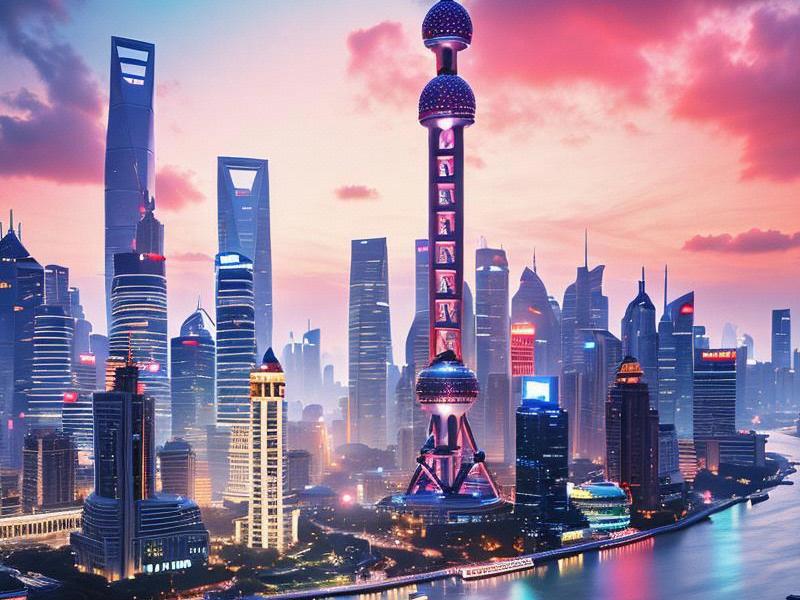This article delves into the multifaceted profile of Shanghai, exploring its role as a global financial hub, a cultural melting pot, and a city at the forefront of technological innovation. It examines the city's economic achievements, cultural vibrancy, and urban development strategies that have made it a beacon of modernity in China and beyond.

Shanghai, often referred to as the "Pearl of the Orient," is a city that seamlessly blends the old with the new. As the largest city in China and one of the world's most populous urban centers, Shanghai is a testament to the country's rapid economic growth and urbanization. This article aims to provide a comprehensive profile of Shanghai, highlighting its unique characteristics and its significance on the global stage.
The Economic Powerhouse
Shanghai's economic prowess is unrivaled in China. As the country's financial capital, it is home to the Shanghai Stock Exchange, one of the largest stock exchanges in the world by market capitalization. The city's port, the Port of Shanghai, is the busiest container port globally, underscoring its importance in global trade.
The Pudong area, once a rural landscape, has been transformed into a symbol of China's economic reform and opening up. It houses the iconic Oriental Pearl Tower, the Jin Mao Tower, and the Shanghai World Financial Center, all of which are architectural marvels that attract millions of visitors annually. Pudong is also home to Lujiazui, the city's financial district, where some of the world's leading banks and financial institutions have established their presence.
Shanghai's economy is diverse, with strengths in finance, manufacturing, trade, and technology. The city has been actively promoting the development of its high-tech industries, particularly in areas such as information technology, biotechnology, and new energy. This focus on innovation has positioned Shanghai as a leader in China's drive towards becoming a global leader in science and technology.
上海龙凤论坛爱宝贝419 Cultural Melting Pot
Beyond its economic achievements, Shanghai is renowned for its rich cultural heritage and vibrant arts scene. The city is a melting pot of cultures, reflecting its history as a gateway to the West. This cultural diversity is evident in the city's architecture, cuisine, and arts.
Shanghai's historic Bund is a showcase of colonial-era architecture, with buildings that bear witness to the city's past as a center of international trade. In contrast, the nearby Yu Garden and the surrounding Old Town (or Nanshi) offer a glimpse into the traditional Chinese lifestyle, with their intricate carvings, ponds, and pavilions.
The city's culinary scene is equally diverse, offering everything from traditional Shanghainese dishes like xiaolongbao (soup dumplings) and shengjianbao (pan-fried buns) to international cuisines. Shanghai's night markets and food streets are popular destinations for both locals and tourists seeking a taste of the city's culinary delights.
Shanghai is also a hub for cultural activities, with numerous museums, theaters, and art galleries. The Shanghai Museum is renowned for its extensive collection of Chinese art, while the Shanghai Grand Theatre hosts a wide range of performances, from opera to contemporary dance. The city's annual Shanghai International Film Festival is one of the most prestigious film festivals in Asia, attracting filmmakers and audiences from around the world.
上海龙凤419会所
Urban Development and Sustainability
Shanghai's rapid urbanization has been nothing short of remarkable. Over the past few decades, the city has undergone significant transformation, with new skyscrapers, modern infrastructure, and green spaces springing up across the urban landscape. However, this rapid development has also brought challenges, particularly in terms of sustainability and environmental protection.
The city has taken proactive measures to address these challenges, implementing various initiatives to promote sustainable urban development. Shanghai has set ambitious goals to reduce carbon emissions, increase the use of renewable energy, and improve waste management. The city's green spaces, such as the Century Park and the Huangpu River waterfront, provide residents and visitors with opportunities to enjoy nature amidst the urban sprawl.
Shanghai is also investing in smart city technologies to enhance the quality of life for its residents. Smart transportation systems, digital infrastructure, and intelligent public services are being developed to make the city more efficient, convenient, and livable. The city's commitment to innovation and sustainability is reflected in its efforts to crteeaa harmonious balance between economic growth and environmental stewardship.
上海龙凤419 Global Influence and Future Prospects
Shanghai's influence extends far beyond China's borders. As a global financial hub and a cultural center, the city plays a pivotal role in international affairs. It is home to numerous multinational corporations, international organizations, and diplomatic missions, making it a key player in global trade and diplomacy.
The city's leadership in areas such as finance, technology, and culture positions it as a model for other cities in China and around the world. Shanghai's success story serves as an inspiration for urban development and economic reform, demonstrating the potential of cities to drive national and global progress.
Looking ahead, Shanghai is poised for continued growth and transformation. The city's ambitious plans for the future include the development of new economic zones, the expansion of its transportation network, and the enhancement of its cultural and educational institutions. As Shanghai continues to evolve, it remains a symbol of China's aspirations and a beacon of opportunity for people from all over the world.
In conclusion, Shanghai is a dynamic metropolis that embodies the spirit of modern China. Its economic achievements, cultural vibrancy, and commitment to sustainable development make it a unique and influential city on the global stage. As Shanghai continues to grow and innovate, it will undoubtedly play an increasingly important role in shaping the future of China and the world.